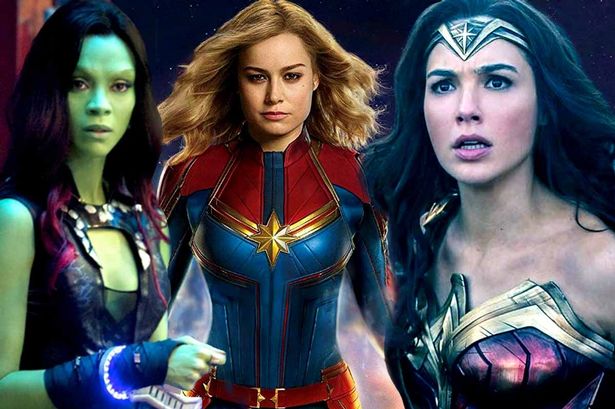Marvel struck gold with Iron Man and began to capitalize on the superhero genre in 2008. Pepper Potts was introduced in the first Iron Man as Tony Stark’s love interest – she worries over his health and safety, later taking over Stark Industries. She exists completely in his context and never seems important to the plot.

The Black Widow movie was announced only after the character sacrificed herself in Endgame in 2019. DC and Warner Bros’ Wonder Woman was the definitive game changer that led to this move. Released in 2017, following a renewed feminist movement across the world in the face of right wing governments, Wonder Woman was an instant success. Feminists and film critics lauded the film for its portrayal of Diana Prince. The film is an origin story that explores how Diana is introduced to man’s world and how she ultimately saves it from itself. She values her femininity and her mission to save the world is ultimately driven (and won) by empathy and kindness.
In the Marvel Cinematic Universe, Taika Waititi’s Thor: Ragnarok introduced us to Valkyrie, whose only “likeable” trait was that she could kick ass in a fight. A complete opposite of Diana – cynical instead of hopeful, a mercenary instead of a saviour, disillusioned instead of amazed at the world around her – and yet, she is a superhero. Where Diana was perfect and good, Valkyrie is messy and selfish – and it’s liberating to watch both of them have complete control over their stories on screen.
Where Diana was perfect and good, Valkyrie is messy and selfish – and it’s liberating to watch both of them have complete control over their stories on screen.
In a bid to appeal to increasingly diverse global audiences, Marvel Studios announced Black Panther. The women of Black Panther were layered and multi-dimensional – Shuri is a genius scientist/princess, Nakia is a radical secret agent, Ramonda is the grieving but strong queen and Okoye is the fiercely loyal chief of the king’s guard. Their character arcs are never hindered by their respective relationships with the hero. Black Panther set a new benchmark for representation.
Brie Larson’s political activism and Infinity War’s post credits scene leading into Captain Marvel, made the movie highly anticipated. When it finally released, the story it told was a distinctly female one. Carol Danvers is constantly told to rein her powers in, to not let her anger fuel her actions. She struggles with her emotions and instincts, not trusting them and believing that they’re getting in her way. This has never been the case with any of the male Avengers – they simply acquire their powers and go trigger happy with them.
But Carol doesn’t get this luxury, and it’s frustrating to watch. Where their anger is righteous and just, her’s is dangerous and unwelcome. She’s the most powerful character in the MCU, and yet she’s the only one forced to fight with one hand tied behind her back. Her memory is erased and she’s then used as a weapon on the wrong side of the war – her agency is stripped in a manner that is jarringly reflective of the world we live in. The definitive moment of the film is when she spares her mentor-turned-nemesis, but not out of the goodness of her heart.
Also read: It’s About Time We Had A Female Indian Superhero!
“I don’t need to prove anything to you,” she says, rising above male validation, quite literally. The film is a remarkably brazen and timely rejection of the many ways in which male perspective shapes female lives. It made a billion dollars at the domestic box office, despite a targeted trolling effort which significantly reduced its score on IMDb and Rotten Tomatoes.
DC made history with the highly entertaining and blessedly free of male gaze Birds of Prey. Harley Quinn has never been a superhero, let alone a feminist one, but Margot Robbie’s portrayal of her in Birds of Prey is hilarious, powerful and downright insane. It does away with all the unnecessary hyper-sexualisation and lets the characters be imperfect.
DC made history with the highly entertaining and blessedly free of male gaze Birds of Prey. Harley Quinn has never been a superhero, let alone a feminist one, but Margot Robbie’s portrayal of her in Birds of Prey is hilarious, powerful and downright insane. It does away with all the unnecessary hyper-sexualisation and lets the characters be imperfect. They are not glorified, a phenomenon that has become sort of an occupational hazard with strong female characters across genres.
While representation seems to be heading in the right direction, it has not been an easy ride. All of these movies have been heavily criticised by misogynists across the world. There are versions of Avengers: Endgame on YouTube – in which all scenes featuring women have been edited out. The actresses have been ruthlessly trolled online, sat across sexist interviewers who are only interested in tight costumes and overtly sexualised by fans and filmmakers alike.
The world of superheroes has always been unfair to women, just like ours. The purpose of stories is to make a variety of audiences empathise with the protagonists and in turn, empathise with the people around them. For ages, these protagonists have been men.
Also read: Captain Marvel: The Female Superhero We Deserve
It’s 2020 but people still don’t seem to understand that empathising with a woman won’t hurt anyone.
Shradhdha is a journalism student, pop culture lover and feminist-in-progress who’s hated universally by cats. You can find her on Twitter and Instagram.
Featured Image Source: Mirror




Hey Shradhdha,
I am a fan of your work already. I want to see more of this. Your voice is fresh and you have dealt with this topic quite surgically.
Awe and Respect,
Janaki
Loved this article so much! A much needed perspective on the aggressively male dominated universe of superheroes. Looking forward to reading more from this guest writer, Shradhdha Das!